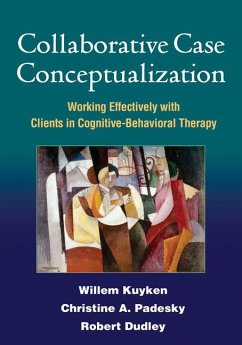Willem Kuyken (United Kingdom University of Oxford), Christine A. Padesky, Robert Dudley (United Kingdom Newcastle University)
Collaborative Case Conceptualization
Working Effectively with Clients in Cognitive-Behavioral Therapy
Willem Kuyken (United Kingdom University of Oxford), Christine A. Padesky, Robert Dudley (United Kingdom Newcastle University)
Collaborative Case Conceptualization
Working Effectively with Clients in Cognitive-Behavioral Therapy
- Broschiertes Buch
- Merkliste
- Auf die Merkliste
- Bewerten Bewerten
- Teilen
- Produkt teilen
- Produkterinnerung
- Produkterinnerung
Presenting an innovative framework for tailoring cognitive-behavioral interventions to each client's needs, this accessible book is packed with practical pointers and sample dialogues.
Andere Kunden interessierten sich auch für
![Case Conceptualization Case Conceptualization]() Len SperryCase Conceptualization38,99 €
Len SperryCase Conceptualization38,99 €![Masters of Narrative and Collaborative Therapies Masters of Narrative and Collaborative Therapies]() Masters of Narrative and Collaborative Therapies64,99 €
Masters of Narrative and Collaborative Therapies64,99 €![Cognitive Behavioral Therapy for Perinatal Distress Cognitive Behavioral Therapy for Perinatal Distress]() Amy WenzelCognitive Behavioral Therapy for Perinatal Distress38,99 €
Amy WenzelCognitive Behavioral Therapy for Perinatal Distress38,99 €![Buddhist Psychology and Cognitive-Behavioral Therapy Buddhist Psychology and Cognitive-Behavioral Therapy]() Dennis Tirch (United Sta The Center for Compassion Focused TherapyBuddhist Psychology and Cognitive-Behavioral Therapy44,99 €
Dennis Tirch (United Sta The Center for Compassion Focused TherapyBuddhist Psychology and Cognitive-Behavioral Therapy44,99 €![Collaborative Therapy Collaborative Therapy]() Diane R. Gehart / Anderson HarleneCollaborative Therapy73,99 €
Diane R. Gehart / Anderson HarleneCollaborative Therapy73,99 €![CBT Treatment Plans and Interventions for Depression and Anxiety Disorders in Youth CBT Treatment Plans and Interventions for Depression and Anxiety Disorders in Youth]() Brian C. Chu (United States Rutgers University)CBT Treatment Plans and Interventions for Depression and Anxiety Disorders in Youth58,99 €
Brian C. Chu (United States Rutgers University)CBT Treatment Plans and Interventions for Depression and Anxiety Disorders in Youth58,99 €![Collaborative Therapy with Multi-Stressed Families, Second Edition Collaborative Therapy with Multi-Stressed Families, Second Edition]() William C. MadsenCollaborative Therapy with Multi-Stressed Families, Second Edition69,99 €
William C. MadsenCollaborative Therapy with Multi-Stressed Families, Second Edition69,99 €-
-
-
Presenting an innovative framework for tailoring cognitive-behavioral interventions to each client's needs, this accessible book is packed with practical pointers and sample dialogues.
Hinweis: Dieser Artikel kann nur an eine deutsche Lieferadresse ausgeliefert werden.
Hinweis: Dieser Artikel kann nur an eine deutsche Lieferadresse ausgeliefert werden.
Produktdetails
- Produktdetails
- Verlag: Guilford Publications
- Seitenzahl: 366
- Erscheinungstermin: 20. Dezember 2011
- Englisch
- Abmessung: 228mm x 151mm x 30mm
- Gewicht: 530g
- ISBN-13: 9781462504480
- ISBN-10: 1462504485
- Artikelnr.: 34384980
- Herstellerkennzeichnung
- Libri GmbH
- Europaallee 1
- 36244 Bad Hersfeld
- gpsr@libri.de
- Verlag: Guilford Publications
- Seitenzahl: 366
- Erscheinungstermin: 20. Dezember 2011
- Englisch
- Abmessung: 228mm x 151mm x 30mm
- Gewicht: 530g
- ISBN-13: 9781462504480
- ISBN-10: 1462504485
- Artikelnr.: 34384980
- Herstellerkennzeichnung
- Libri GmbH
- Europaallee 1
- 36244 Bad Hersfeld
- gpsr@libri.de
Willem Kuyken, PhD, is Professor of Clinical Psychology at the University of Exeter, United Kingdom; Cofounder of the Mood Disorders Centre; and a Fellow of the Academy of Cognitive Therapy. His primary research and clinical interests are case conceptualization and cognitive-behavioral approaches to depression, and he has published more than 50 articles and book chapters. Dr. Kuyken is a recipient of the May Davidson Award from the British Psychological Society. Christine A. Padesky, PhD, a clinical psychologist, is cofounder of the Center for Cognitive Therapy in Huntington Beach, California; codeveloper of Strengths-Based CBT; and coauthor of seven books, including the bestselling self-help resource Mind Over Mood, Second Edition. Dr. Padesky is a recipient of the Aaron T. Beck Award for significant and enduring contributions to the field of cognitive therapy from the Academy of Cognitive Therapy (now the Academy of Cognitive and Behavior Therapies; ACBT), the Distinguished Contribution to Psychology Award from the California Psychological Association, and the British Association for Behavioural and Cognitive Psychotherapies (BABCP) Award for Most Influential International CBT Therapist. She has been named a Distinguished Founding Fellow of the ACBT and an Honorary Fellow of the BABCP. The BABCP voted Mind Over Mood the most influential CBT book of all time. Dr. Padesky has taught workshops to more than 50,000 therapists internationally and is renowned for her ability to integrate theory, empiricism, creativity, and practical therapy skills. She consults worldwide and develops audio and video training materials for therapists. Her free video training series for therapists is posted at www.youtube.com/ChristinePadesky. Her websites are www.mindovermood.com (for the general public) and www.padesky.com (for mental health professionals). Robert Dudley, PhD, is a Consultant Clinical Psychologist for the Early Intervention in Psychosis Service at the Northumberland, Tyne, and Wear Mental Health NHS Trust, United Kingdom. He also serves on the staff of the Institute of Neuroscience at Newcastle University. Dr. Dudley's primary clinical and research focus is the understanding and treatment of psychotic symptoms. As a clinician, trainer, and supervisor, he developed an interest in case conceptualization and has undertaken several research projects in this area.
1. The Procrustean Dilemma
2. The Case Conceptualization Crucible: A New Model
3. Two Heads Are Better Than One: Collaborative Empiricism
4. Incorporating Client Strengths and Building Resilience
5. "Can You Help Me?": Descriptive Case Conceptualization
6. "Why Does This Keep Happening to Me?": Cross-Sectional Explanatory
Conceptualizations
7. "Does My Future Look Like My Past?": Longitudinal Explanatory
Conceptualizations
8. Learning and Teaching Case Conceptualization
9. Appraising the Model
Appendix. Aid to History Taking Form
2. The Case Conceptualization Crucible: A New Model
3. Two Heads Are Better Than One: Collaborative Empiricism
4. Incorporating Client Strengths and Building Resilience
5. "Can You Help Me?": Descriptive Case Conceptualization
6. "Why Does This Keep Happening to Me?": Cross-Sectional Explanatory
Conceptualizations
7. "Does My Future Look Like My Past?": Longitudinal Explanatory
Conceptualizations
8. Learning and Teaching Case Conceptualization
9. Appraising the Model
Appendix. Aid to History Taking Form
1. The Procrustean Dilemma
2. The Case Conceptualization Crucible: A New Model
3. Two Heads Are Better Than One: Collaborative Empiricism
4. Incorporating Client Strengths and Building Resilience
5. "Can You Help Me?": Descriptive Case Conceptualization
6. "Why Does This Keep Happening to Me?": Cross-Sectional Explanatory
Conceptualizations
7. "Does My Future Look Like My Past?": Longitudinal Explanatory
Conceptualizations
8. Learning and Teaching Case Conceptualization
9. Appraising the Model
Appendix. Aid to History Taking Form
2. The Case Conceptualization Crucible: A New Model
3. Two Heads Are Better Than One: Collaborative Empiricism
4. Incorporating Client Strengths and Building Resilience
5. "Can You Help Me?": Descriptive Case Conceptualization
6. "Why Does This Keep Happening to Me?": Cross-Sectional Explanatory
Conceptualizations
7. "Does My Future Look Like My Past?": Longitudinal Explanatory
Conceptualizations
8. Learning and Teaching Case Conceptualization
9. Appraising the Model
Appendix. Aid to History Taking Form








